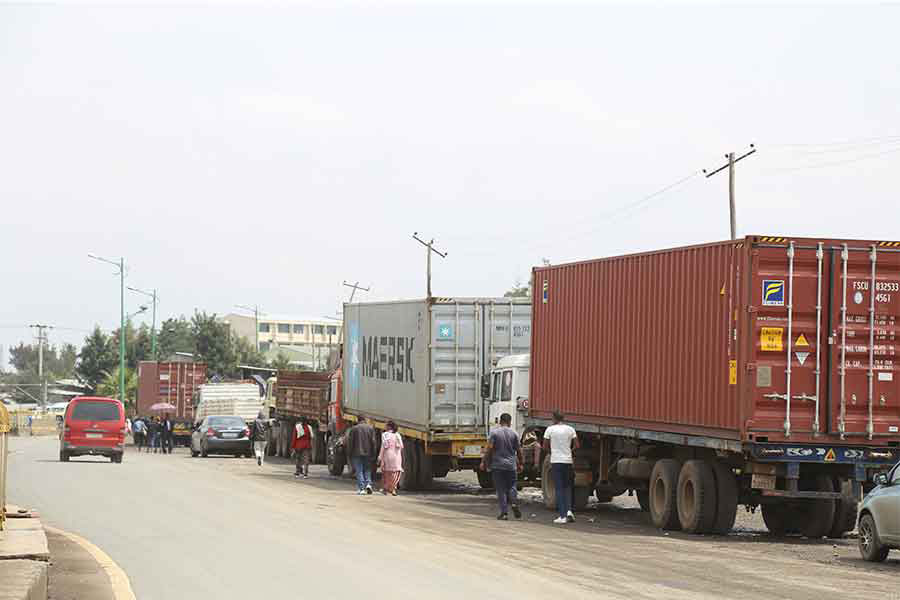
Fortune News | May 15,2021
China has sneezed and dozens of countries around the world have caught a cold. The Novel Coronavirus Disease 2019 (COVID-19), a respiratory illness that began in the Wuhan District of China, has infected over 100,000 people across the world and has claimed its first victim in Ethiopia - the economy.
A relatively new and tiny player in the global economy, Ethiopia has been hit as a result of restrictions and delays in the shipping of goods and travel of people. Local businesses that rely on raw materials, goods and skilled human power exported from China, Ethiopia’s biggest trade partner, have been afflicted most severely.
The virus, which has a mortality rate of between one and four percent, around 20 times higher than the seasonal flu, could cost the global economy 2.7 trillion dollars, according to the most ‘extreme’ projection by Bloomberg Economics.
This remains the case even as the rate of new cases in China has declined, while a growing number of cases continue to crop up in countries around the world, including South Korea, Italy, Iran and the United States. One local importer told Fortune that the global spread, and the subsequent economic ripple effect, has cost him about half of his expected revenues.
Ethiopian Airlines, the nation’s flagship carrier, has not been breathing light either. Passenger traffic to its four gateways in mainland China and one in Hong Kong have dropped by a fourth. As a result, the airline has cut flight capacity by 20pc and started to renegotiate contracts, including aircraft leases, scaling down the size of offices and reducing staff.
The difficulties the airline is experiencing are in line with the estimates of the International Air Transport Association (IATA). Airline share prices have fallen by a staggering 25pc, and estimates for global revenue losses in the industry for this year stand between 63 billion and 113 billion dollars, according to the IATA.
The virus, which has a mortality rate of between one and four percent, around 20 times higher than the seasonal flu, could cost the global economy 2.7 trillion dollars, according to the most ‘extreme’ projection by Bloomberg Economics. But the possible extent of its consequences for Ethiopia are unknown. In the best case scenario, the economic challenge it poses will last at least four months, according to economists.
You can read the full story here .
PUBLISHED ON
Mar 13,2020 [ VOL
20 , NO
1037]

Fortune News | May 15,2021

Viewpoints | Oct 19,2019

Editorial | Sep 23,2023

Radar | May 28,2022

Viewpoints | Apr 19,2025

Advertorials | Jun 05,2023

Commentaries | Aug 08,2020

Radar | Mar 28,2020

Fortune News | Aug 06,2022

Radar | Jan 21,2023

Dec 22 , 2024 . By TIZITA SHEWAFERAW
Charged with transforming colossal state-owned enterprises into modern and competitiv...

Aug 18 , 2024 . By AKSAH ITALO
Although predictable Yonas Zerihun's job in the ride-hailing service is not immune to...

Jul 28 , 2024 . By TIZITA SHEWAFERAW
Unhabitual, perhaps too many, Samuel Gebreyohannes, 38, used to occasionally enjoy a couple of beers at breakfast. However, he recently swit...

Jul 13 , 2024 . By AKSAH ITALO
Investors who rely on tractors, trucks, and field vehicles for commuting, transporting commodities, and f...

Oct 25 , 2025
The regulatory machinery is on overdrive. In only two years, no fewer than 35 new pro...

Oct 18 , 2025
The political establishment, notably the ruling party and its top brass, has become p...

Oct 11 , 2025
Ladislas Farago, a roving Associated Press (AP) correspondent, arrived in Ethiopia in...

Oct 4 , 2025
Eyob Tekalegn (PhD) had been in the Governor's chair for only weeks when, on Septembe...